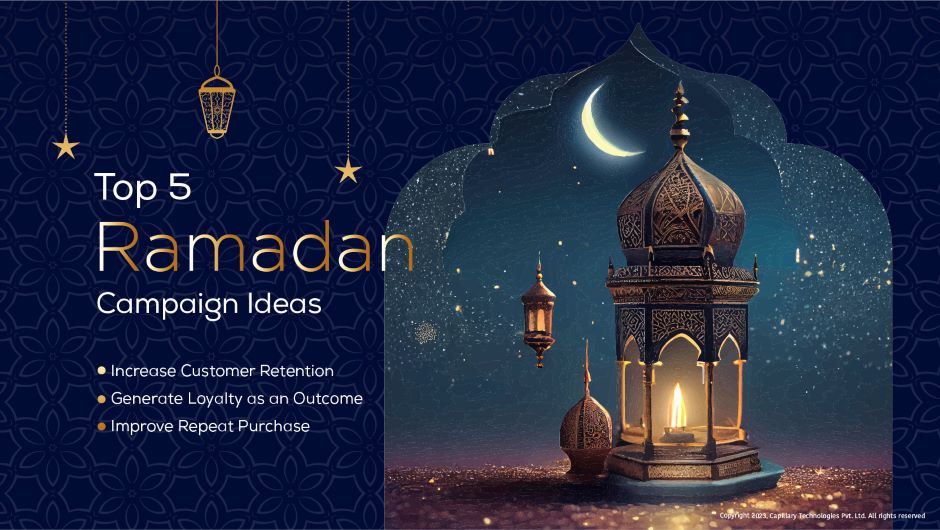- Design industry shaping loyalty programs
- Integrate easily and go live quicker
- Deliver hyper-personalized consumer experiences
Blue Rewards from Al Futtaim Group Shares Loyalty Success Stories and Evolution. Watch Podcast >
Capillary Triumphs with 4 Prestigious Wins at the 2025 International Loyalty Awards! Read more >

For decades, segmentation has been a crucial aspect of customer engagement strategies. Retailers categorize customers by broad characteristics like gender, age, or purchasing power to craft their marketing campaigns. Although this strategy was effective for its time, this approach falls short in today’s dynamic market.
Modern consumers are well-informed and demand tailored experiences. We’ve seen a shift from basic segmentation to personalized customer engagement strategies to align with customer preferences and meet their ever-changing needs.
Most of our interactions today are personalized and it’s a norm in any enterprise’s marketing funnel. It is paramount for enterprises to interact with their customers in a highly engaging and personalized manner, or you are out of the race!
This is where Personalized customer engagement comes into the picture. It refers to creating tailored interactions with customers based on their preferences, behaviors, and needs. Unlike traditional, one-size-fits-all approaches, the personalized approach focuses on making every customer feel valued and understood through targeted offers, communications, and experiences.
For instance, imagine an online retailer using browsing history to recommend products or a restaurant chain sending a personalized offer for a customer’s favorite dish on their birthday. These moments of personalization not only enhance the customer experience but also foster loyalty and an emotional connection with the brand. Ready to take your loyalty game up a notch? Check out our Loyalty+ platform to know more!
The key to personalized customer engagement lies in leveraging tools like AI-driven personalization and customer segmentation strategies. These technologies facilitate enterprises to analyze customer data in real time and deliver relevant, context-specific messages. By addressing individual preferences, brands can improve customer satisfaction, drive repeat purchases, and strengthen their competitive edge in the market.
In today’s hyper-competitive landscape, data-driven personalization has become a critical component of successful customer engagement strategies. By analyzing customer data—ranging from purchase history and browsing behavior to location and preferences—brands can craft highly relevant and impactful campaigns.
Here’s why it’s so important:
Data-driven personalization ensures that customers receive offers and recommendations that resonate with them. For instance, a beauty brand can use purchase history to recommend skincare products that complement items a customer already owns.
Personalized messages are far more likely to capture attention. According to studies, personalized emails have a 29% higher open rate and a 41% higher click-through rate than generic emails.
Customers who feel understood and valued are more likely to stay loyal to a brand. Tailored rewards, exclusive offers, and personalized experiences can significantly enhance loyalty programs. Explore Capillary’s Rewards+ to up your loyalty campaign game!
With data-driven personalization techniques, brands can focus their efforts on the right customers, reducing wasteful spending on broad, untargeted campaigns.
For instance, a retailer might identify a segment of high-value customers who frequently shop during the holiday season. By sending early-bird discounts or personalized holiday gift guides, they can boost engagement and drive sales. This strategic use of data ensures not just better customer engagement but also measurable ROI for businesses.
Data-driven personalization facilitates brands to stay relevant, competitive, and connected in today’s dynamic market. Enterprises that leverage customer data effectively can transform their marketing strategies, improve customer relationships, and achieve sustainable growth.
Traditional campaigns built on broad segmentation often fail to resonate with diverse customer bases. The rise of customer segmentation strategies like micro-segmentation—breaking audiences into highly specific behavioral groups—has redefined how brands approach engagement. Retailers like Tesco have achieved incredible success, dividing their customer base into over 5,000 micro-segments and delivering 250,000 personalized offers. These data-driven personalization techniques have consistently delivered higher response rates, proving that personalization isn’t just an enhancement; it’s a necessity.
By adopting micro-segmentation, brands can create campaigns tailored to unique customer needs, resulting in significantly higher engagement. For instance, India’s diverse culture and consumer preferences necessitate hyper-targeted offers that make customers feel uniquely valued. It’s no longer about the one-size-fits-all approach but about showing customers that you truly understand them.
The real power behind modern personalized customer engagement lies in AI-driven personalization. Artificial intelligence and machine learning enable brands to analyze vast amounts of customer data in real-time, creating dynamic, individualized experiences. For instance, AI tools can identify patterns like frequent shopping hours or preferred products, allowing brands to deliver the right offers at the right moment.
Picture this: A customer adds an item to their cart but doesn’t complete the purchase. AI systems can analyze the customer’s behavior, identify hesitation points, and send a real-time push notification with a dynamic discount. This level of immediacy and relevance is only possible through AI-driven personalization. It’s not just about responding to customer actions but anticipating their needs before they’re even expressed.
Customers today engage with brands across multiple channels—websites, mobile apps, social media, and physical stores. An effective customer engagement strategy ensures these interactions are seamlessly connected through omnichannel personalization.
For instance, imagine a customer purchasing skincare products in-store. The next day, they receive a personalized email recommending complementary items, followed by a push notification for a special promotion on their favorite brand. These touchpoints work together to create a cohesive, engaging experience. Omnichannel strategies ensure customers feel recognized and valued, no matter where or how they interact with a brand.
True loyalty extends beyond transactional relationships—it’s about fostering emotional connections with your customers. Personalization, when done right, plays a crucial role in building this emotional bond. Through data-driven personalization techniques, brands can offer experiences that resonate on a deeper level.
For instance, luxury brands can use AI-driven personalization to recommend exclusive experiences or limited-edition products based on a customer’s past purchases. This makes customers feel special and strengthens their connection to the brand. Emotional loyalty not only drives repeat purchases but also transforms customers into brand advocates.
While personalization relies on data, the way brands collect and use that data is under intense scrutiny. Ethical personalization starts with transparency. Customers are far more likely to share their information if they know exactly how it will be used to enhance their experiences. For example, retailers can allow customers to set preferences for what type of communication they’d like to receive or how their data will be handled.
By focusing on privacy-first personalization, brands can strike a balance between personalization and trust. Being upfront about data usage builds customer confidence and ensures long-term loyalty. A clear data strategy is not just about compliance; it’s about fostering meaningful, trust-driven relationships.
To thrive in the personalization era, brands must implement a clear, actionable strategy that leverages data-driven personalization techniques. Here’s a step-by-step framework:
Gather zero- and first-party data from reliable sources while maintaining transparency about its use.
Use advanced customer segmentation strategies to identify unique behavioral patterns and preferences.
Leverage AI and machine learning to create dynamic, contextually relevant campaigns.
Ensure consistent personalization across all customer touchpoints.
Continuously analyze campaign performance, refine strategies, and adapt to changing customer needs. This approach not only enhances engagement but also delivers measurable business outcomes, such as improved response rates, higher retention, and stronger loyalty.
As customers demand more tailored and meaningful experiences, enterprises that adopt AI-driven personalization, ethical data practices, and omnichannel strategies will emerge at the top. The question is no longer if you should embrace personalization—it’s how fast you can implement it.
Capillary is the perfect partner for enterprises looking to amp up their customer engagement and retention game! With Capillary’s robust loyalty suite, you gain access to cutting-edge loyalty tools powered by AI and ML taking your loyalty game to a whole new level. From AI-driven personalization and advanced segmentation to real-time omnichannel engagement, Capillary enables enterprises like yours to deliver the right offers to the right customers at the right time.
Whether it’s enhancing customer loyalty, driving repeat purchases, or fostering brand affinity, Capillary’s platform ensures measurable results that align with your business goals. Talk to our Loyalty Experts today!
Personalized customer engagement involves tailoring interactions, offers, and communications to individual customer preferences and behaviors. It is essential because it enhances customer satisfaction, drives loyalty, and increases the likelihood of repeat purchases. By leveraging AI-driven personalization and data-driven personalization techniques, businesses can create experiences that resonate with customers on a personal level, fostering long-term relationships.
AI-driven personalization improves customer engagement by analyzing large volumes of customer data in real-time to predict preferences and deliver highly relevant offers. For example, AI can identify shopping patterns and send dynamic, context-based recommendations at the right moment. This approach ensures that customers feel understood and valued, significantly enhancing engagement and boosting conversion rates.
Traditional customer segmentation strategies divide customers into broad groups based on basic demographics like age or gender. In contrast, micro-segmentation uses data-driven personalization techniques to create highly specific segments based on behaviors, preferences, and purchase patterns. For instance, instead of targeting all “millennial women,” micro-segmentation might identify a subset of women who prefer eco-friendly products and shop during sales events, allowing for more precise targeting.
Data-driven personalization techniques can transform loyalty programs by tailoring rewards and offers to each customer’s preferences and behaviors. For example, instead of offering generic discounts, a retailer could use customer segmentation strategies to identify high-value customers and provide exclusive perks like early access to sales or personalized product recommendations. This level of personalization fosters emotional loyalty and increases customer retention.
Ethical data usage is vital for building trust in personalized customer engagement. Customers are more willing to share their information when they know it will be used responsibly and transparently. By adopting privacy-first personalization practices, such as allowing customers to set data-sharing preferences and being clear about how their data is used, businesses can ensure compliance and foster stronger, trust-based relationships with their audience.

December 6, 2024 | 5 Min Read
The growth of ecommerce has redefined customer expectations,

October 16, 2024 | 6 Min Read
A month of self-reflection, devotion, and prayer per the Isl

December 11, 2024 | 7 Min Read
As customers demand more tailored and meaningful experiences